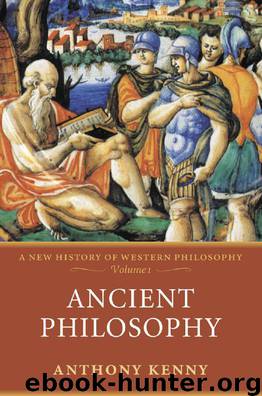0198752725.pdf by Unknown

Author:Unknown
Language: eng
Format: mobi
Published: 0101-01-01T00:00:00+00:00
The opening of a book of Lucretius’ De Rerum Natura in an illuminated manuscript from the British Library
E P I S T E M O L O G Y
Lucretius, like Aristotle, points out that one sense cannot be corrected
by another with regard to its proper object. But the Epicureans go
further than Aristotle in claiming a sense cannot even correct its
own impressions: each impression is of equal reliability and hence
whatever appears to a sense at any time is true (Lucretius 4. 497–9;
D.L. 10. 31).
By treating all appearances as on a par, instead of grading them in terms
of reliability, Epicureans rule out Aristotle’s method of dealing with con-
Xicting impressions, such as that of a tower that looks round from a
distance but square close up. Instead, they claim that in such a case we
have two equally valid impressions, but impressions of diVerent objects.
Sextus Empiricus explains how Epicurus would deal with the problem, by
invoking his atomistic explanation of sight as an encounter with a stream
of images Xowing from an object of vision.
I would not say that sight is deceived when from a great distance it sees a tower
as small and round, and from nearby as large and square. Rather, it is quite
correct. When what is perceived appears small and so-shaped, it really is small and
shaped like that, because the edges of the images have been rubbed oV as a result of
their journey through the air. And when it appears big and of a diVerent shape,
once again it really is big and of that shape. But the two are not the same.
(M. 7. 208)
Our common impression that these are two glimpses of the same thing,
Epicurus says, is due not to perception but to ‘distorted belief’. He deals in a
similar way with other objections to the infallibility of sensation, such as
dreams and delusions. When Orestes thought he saw the Furies, his sight
was not deceived because there were genuine images present; it was his
mind that erred in taking them as solid bodies (S.E., M. 8. 63). We must
distinguish sharply between a sense-impression (phantastike epibole) and an
accompanying, but distinct, belief (D.L. 10. 51).
Sensations, therefore, the Wrst criteria of truth, in spite of their
infallibility, provide only a rather slender base for the structure of our
knowledge. We need to turn to the second set of criteria, namely concepts.
Epicurus’ word ‘prolepsis’ is often translated ‘preconceptions’, but that
is misleading, partly because it suggests prejudice, partly because it suggests
something that would be expressed by a whole proposition, while most
of the examples we are given are expressed by single words, such as
‘body’, ‘man’, ‘cow’, ‘red’. A concept is a general notion of what kind of
168
E P I S T E M O L O G Y
thing is signiWed by such a word (which may, of course, be expressed in a
sentence of paraphrase, such as ‘A cow is an animal of such-and-such
a kind’). The ‘pro’ in ‘prolepsis’ is meant to indicate that a concept of X is
not a set of information about X derived from experience, but rather
a template by which we recognize in advance whether an individual
presented in experience is or is not an X.
Download
This site does not store any files on its server. We only index and link to content provided by other sites. Please contact the content providers to delete copyright contents if any and email us, we'll remove relevant links or contents immediately.
The Goal (Off-Campus #4) by Elle Kennedy(13674)
Kathy Andrews Collection by Kathy Andrews(11832)
Diary of a Player by Brad Paisley(7581)
Assassin’s Fate by Robin Hobb(6217)
What Does This Button Do? by Bruce Dickinson(6207)
Big Little Lies by Liane Moriarty(5804)
Altered Sensations by David Pantalony(5104)
Pale Blue Dot by Carl Sagan(5008)
Sticky Fingers by Joe Hagan(4199)
The Death of the Heart by Elizabeth Bowen(3622)
The Heroin Diaries by Nikki Sixx(3550)
Confessions of a Video Vixen by Karrine Steffans(3309)
Beneath These Shadows by Meghan March(3308)
How Music Works by David Byrne(3270)
The Help by Kathryn Stockett(3147)
Jam by Jam (epub)(3092)
Harry Potter 4 - Harry Potter and The Goblet of Fire by J.K.Rowling(3074)
Computational Linguistics and Intelligent Text Processing: 20th International Conference, CICLing 2019 La Rochelle, France, April 7â13, 2019 Revised Selected Papers, Part I by Alexander Gelbukh(2995)
Strange Fascination: David Bowie: The Definitive Story by David Buckley(2872)
